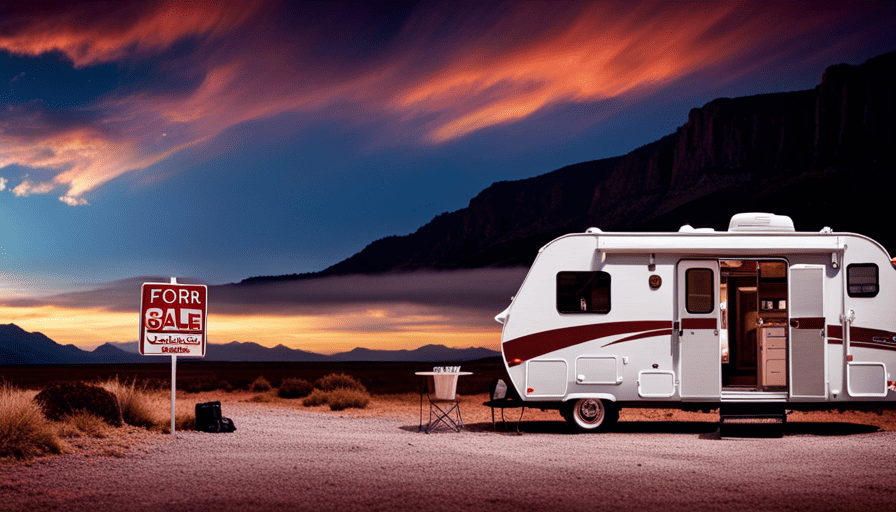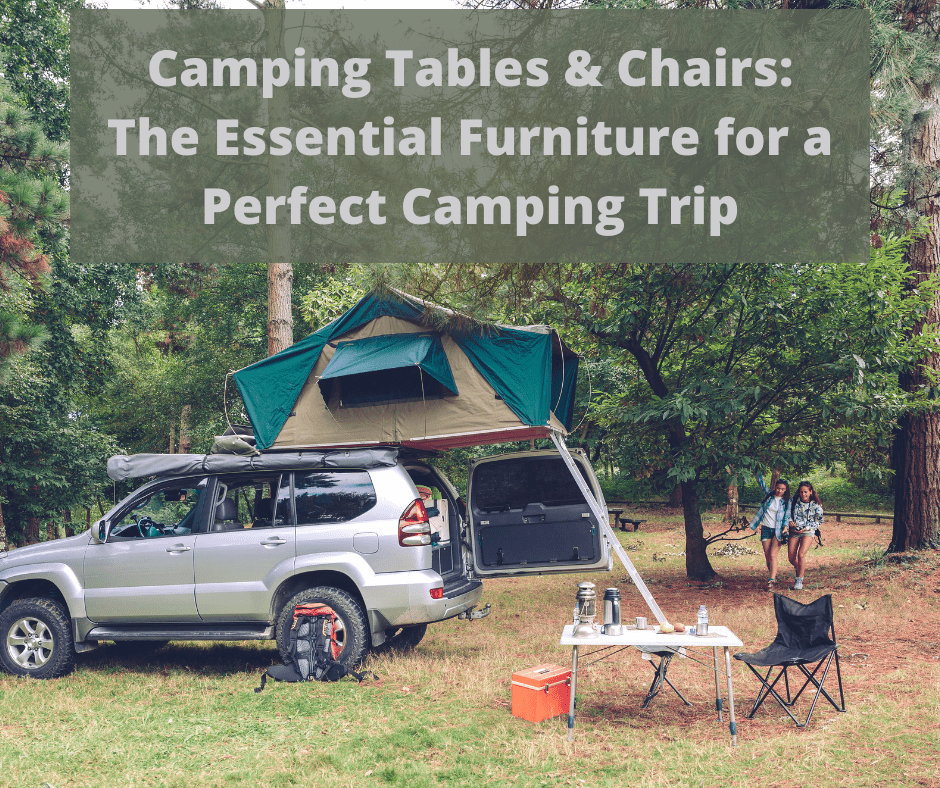Selling a camper that you haven’t fully paid off yet can be as challenging as finding your way through a serpentine mountain path. However, worry not, fellow explorers! We’re here to lead you through the procedure, armed with specialist advice and pro tips.
Selling a camper while still having a loan may seem daunting, but with the right approach, it can be a smooth journey towards financial freedom. Just like a seasoned navigator carefully selects the best route, we’ll show you how to determine your loan payoff amount, assess the market value of your camper, and prepare it for sale.
We’ll also share strategies for advertising, negotiating the sale price, and completing all necessary documentation. As we embark on this selling expedition together, rest assured that we’ll keep you informed, empowered, and ready to tackle any challenges that arise along the way.
Let’s hit the open road and start selling that camper!
Key Takeaways
- Determine the loan payoff amount by contacting your lender and gather necessary documents and information.
- Assess the market value of your camper by comparing similar ones for sale and consider market demand and current trends.
- Clean, organize, and make necessary repairs and improvements to increase the value of your camper.
- Utilize online platforms, classified ads, social media, and networking to effectively advertise your camper and reach potential buyers.
Determine Your Loan Payoff Amount
Before you can sell your camper, it’s important to determine how much money you still owe on your loan. To calculate the payoff amount, the first step is to contact your lender. They’ll provide you with the exact amount remaining on your loan, including any interest or fees that may apply.
It’s crucial to have this information in order to accurately price your camper and negotiate with potential buyers.
To contact your lender, gather all the necessary documents, such as your loan agreement and account number. Reach out to their customer service department or the specific department that handles loans. Provide them with the required information and request the payoff amount. They may require additional verification or documentation, so be prepared to provide any necessary paperwork promptly.
Once you have the payoff amount, you can then assess the market value of your camper. By comparing similar campers for sale, you can determine a fair asking price for your vehicle. This will help attract potential buyers and negotiate a reasonable deal.
Assessing the market value will be discussed in the next section, where we’ll explore various factors to consider when pricing your camper for sale.
Assess the Market Value of Your Camper
First, take a moment to picture the jaw-dropping market value of your beloved home-away-from-home on wheels. Assessing the market demand and determining a fair price for your camper is crucial before selling it.
To start, research the current market trends and check out similar campers that are currently for sale. Look for campers in similar condition, age, and with similar features to get a sense of their asking prices. This will give you an idea of the potential value of your own camper.
Additionally, consider the demand for campers in your area. Are there many buyers looking for campers like yours? Is it a popular time of year for camping and RV travel? These factors can affect the market value of your camper. Keep in mind that the market value may be different from the amount you still owe on your loan.
Once you have assessed the market value of your camper, you can determine a fair price that will attract potential buyers. Consider any additional factors such as the condition of your camper, any upgrades or modifications you have made, and the overall desirability of your model. By pricing your camper competitively, you will increase your chances of a successful sale.
As you prepare your camper for sale, you’ll want to consider a few important steps. [Transition]
Prepare Your Camper for Sale
Get your camper ready to hit the market by sprucing it up, making any necessary repairs, and enhancing its features to attract potential buyers.
Preparing your camper for sale is an essential step in the process. Start by thoroughly cleaning and organizing the interior and exterior. Remove any personal items and clutter to create a clean and inviting space for potential buyers to envision themselves in. Pay attention to details such as carpets, upholstery, and windows, ensuring they’re spotless and in good condition.
Setting a competitive price is crucial to attract buyers. Research the current market value of similar campers in your area to get an idea of what price range to aim for. Consider factors such as the age, condition, and features of your camper when determining the price.
In addition to cleaning and setting a competitive price, making necessary repairs and improvements can significantly increase the value of your camper. Address any mechanical issues, fix leaks or damages, and replace worn-out parts. Enhancing the features of your camper, such as adding new appliances or updating the interior decor, can also make it more appealing to potential buyers.
By preparing your camper for sale, cleaning and organizing it, setting a competitive price, and making necessary repairs and improvements, you increase your chances of attracting interested buyers. Now that your camper’s in prime condition, it’s time to advertise it and spread the word to potential buyers.
Advertise Your Camper
When it comes to advertising your camper, we’ve found that utilizing online platforms and classified ads is the most effective way to reach a wide audience.
By posting your camper on websites dedicated to RV sales and using popular classified ad sites, you can increase your chances of finding the right buyer.
Additionally, spreading the word through social media and networking can help you reach potential buyers who may not be actively searching for a camper but could be interested in purchasing one.
Utilize Online Platforms and Classified Ads
Make use of the vast online marketplace and various classified ads to unveil the hidden potential of your camper, symbolizing the limitless possibilities that await its new owner.
By utilizing online platforms and classified ads, you can maximize profits and negotiate effectively. These platforms provide a wide reach and allow you to target specific audiences interested in purchasing a camper.
Take advantage of popular online marketplaces such as Craigslist, eBay, and RV Trader to showcase your camper’s unique features and attract potential buyers. Additionally, consider advertising on specialized classified ad websites that cater specifically to RVs and campers. These platforms often have a dedicated audience of buyers who are actively searching for campers.
By utilizing these online resources, you can expand your reach and increase your chances of selling your camper quickly and at a desirable price.
Once you have effectively utilized online platforms, it’s time to spread the word through social media and networking, connecting with potential buyers and reaching a wider audience.
Spread the Word through Social Media and Networking
Spread the word through social media and networking, connecting with potential buyers and expanding our reach to ignite excitement and create a buzz around our camper.
Social media promotion is a powerful tool that allows us to showcase the unique features and benefits of our camper to a wide audience. We can create eye-catching posts with high-quality images and detailed descriptions to capture the attention of potential buyers. By sharing these posts on platforms like Facebook, Instagram, and Twitter, we can reach a large number of people who may be interested in purchasing our camper.
Additionally, we can leverage our personal and professional networks to spread the word even further. Networking strategies, such as attending local RV clubs or events, can help us connect with individuals who are specifically looking for a camper like ours.
By utilizing social media and networking, we can generate interest and attract potential buyers to negotiate the sale price in the next section.
Negotiate the Sale Price
To get the best deal, it’s important to engage in effective negotiation techniques to secure the desired sale price for your camper that you still owe money on. Negotiating the sale price can be a crucial step in ensuring a successful sale while also minimizing any financial losses.
It is essential to start by researching the market value of similar campers to have a baseline for setting a fair price. This will help you determine a realistic price range and enable you to negotiate confidently.
When negotiating, it’s important to consider various strategies. One effective approach is to highlight the unique features and benefits of your camper that set it apart from others on the market. Emphasizing its excellent condition, recent upgrades, or low mileage can justify a higher asking price. Additionally, being flexible and open to negotiation can help create a positive atmosphere and encourage potential buyers to engage in the negotiation process.
By employing these negotiation strategies and setting a fair price, you increase your chances of achieving a successful sale. Once the sale price is agreed upon, you can then proceed to handle financing and loan transfer. This step involves coordinating with your lender to ensure a smooth transition of ownership and the transfer of the remaining loan balance.
Handle Financing and Loan Transfer
Ensure a seamless transition of ownership and transfer the remaining loan balance by working closely with your lender, allowing you to embark on a worry-free journey towards financial freedom. When it comes to handling financing and loan transfer for your camper sale, there are a few essential steps to follow.
First, contact your lender to inform them of your intention to sell the camper. They’ll provide you with important information about the loan transfer process and any necessary paperwork. It’s crucial to stay in close communication with your lender throughout the entire process to ensure everything is done correctly.
Next, work with the buyer to determine how the loan will be paid off. If the buyer is obtaining financing, they’ll need to apply for a loan and arrange for the funds to be transferred to your lender. Alternatively, if the buyer is paying in cash, you can work with your lender to coordinate the payoff amount and transfer the title.
Once the financing and loan transfer are sorted out, you can move on to completing the sale agreement and documentation. This will involve drafting a bill of sale, transferring the title, and transferring any warranties or service contracts.
By handling the financing and loan transfer efficiently, you can smoothly transition to finalizing the sale and completing the necessary paperwork.
Complete the Sale Agreement and Documentation
Start by finalizing the sale agreement and gathering all necessary documentation, ensuring a smooth and seamless transition of ownership for the buyer.
It’s crucial to have a comprehensive sale agreement in place that outlines the terms and conditions of the sale, including the purchase price, payment terms, and any additional agreements between the buyer and seller.
Additionally, gather all relevant documentation such as the title, registration, and maintenance records to provide to the buyer.
When selling a camper, professional photography can greatly enhance the chances of attracting potential buyers. High-quality photos showcase the camper’s features and condition, making it more appealing to buyers.
Make sure to capture images of both the exterior and interior, highlighting any unique features or selling points.
Another important aspect of selling a camper is writing an effective sales description. Be sure to provide accurate and detailed information about the camper, including its size, year, make, model, and any additional features or upgrades.
Highlight any recent maintenance or repairs, as well as any extras that may be included in the sale.
In the next section, we’ll discuss how to pay off your loan and transfer the remaining balance to the lender.
Pay off Your Loan
Now that you’ve completed the sale agreement and gathered all the necessary documentation, it’s time to tackle the next important step in selling a camper you still owe money on: paying off your loan. This step is crucial in ensuring a seamless transfer of ownership and avoiding any complications down the line.
Determining eligibility for loan repayment options is the first thing you should do. Contact your lender to discuss your situation and explore the available options. They’ll provide you with the necessary information regarding the outstanding balance, interest rates, and any fees associated with early loan repayment.
Once you have a clear understanding of your loan details, you can consider different loan repayment options. Here are three common options to consider:
-
Paying off the loan in full: If you have the financial means, paying off the loan in full will release the lien on your camper and allow for a smooth transfer of ownership.
-
Refinancing the loan: If paying off the loan in full isn’t feasible, you may explore refinancing options to potentially lower monthly payments or secure a better interest rate.
-
Negotiating a payoff: In some cases, you may be able to negotiate a payoff amount with your lender that’s less than the total outstanding balance. This option can save you money and expedite the loan repayment process.
With your loan paid off, you can now move on to the final step: finalizing the sale and transferring ownership.
Finalize the Sale and Transfer Ownership
Once your loan’s been paid off, it’s time to proceed with finalizing the sale and transferring ownership of the camper.
The first step is to transfer the title to the new owner. To do this, you’ll need to fill out the necessary paperwork, which typically includes a bill of sale and a title transfer form. Make sure to provide the buyer with all the required documents, and make sure they’re signed and dated correctly. It’s important to follow your state’s DMV guidelines to avoid complications.
Another consideration when finalizing the sale is the sales tax. Depending on your state’s regulations, you may need to collect and remit sales tax to the appropriate government agency. Be sure to check with your local DMV or tax office for specific requirements.
Once the title transfer and sales tax considerations are taken care of, you can proceed to the next step of following legal requirements and regulations. This includes fulfilling all necessary obligations, such as canceling insurance policies and notifying the DMV of the change in ownership.
Follow Legal Requirements and Regulations
To ensure a smooth and hassle-free process, don’t forget to double-check all the legal requirements and regulations that need to be followed when finalizing the sale and transferring ownership of your beloved adventure vehicle. Understanding your legal obligations is crucial when selling a camper that you still owe money on. It’s advisable to seek professional advice to ensure you comply with all the necessary legalities.
One of the first steps is to review your loan agreement to determine any specific requirements or restrictions related to selling the camper. Some lenders may have specific procedures or documentation that need to be followed. It’s important to communicate with your lender and inform them about your intention to sell the camper.
Next, you’ll need to transfer the ownership of the camper to the buyer. This typically involves completing the necessary paperwork, such as a bill of sale and title transfer. Make sure to obtain a lien release from your lender once the payment is received, as this’ll remove their claim on the vehicle.
Additionally, it’s important to comply with any state regulations pertaining to the sale of vehicles. This may include obtaining a safety inspection or emissions test, paying any outstanding taxes or fees, and providing the buyer with a valid vehicle identification number (VIN) report.
By understanding and adhering to the legal requirements and regulations, you can ensure a smooth and legally compliant sale of your camper. Seeking professional advice can provide you with the necessary guidance and peace of mind throughout the process.
Frequently Asked Questions
What should I do if the market value of my camper is lower than the loan payoff amount?
When the market value of your camper is lower than the loan payoff amount, negotiating the price becomes crucial. It’s essential to have a clear understanding of the market and your loan balance.
Start by researching similar campers for sale and use that information to negotiate with potential buyers. Additionally, consider managing your loan balance by paying off any remaining balance after the sale.
Remember, careful negotiation and informed decision-making are key to successfully selling a camper in this situation.
Can I advertise my camper for sale while I still owe money on it?
Yes, you can advertise your camper for sale while you still owe money on it. There are several advertising options and selling strategies you can consider.
Online platforms such as classified websites and social media groups are popular choices for reaching potential buyers. Additionally, you can place advertisements in local newspapers or utilize word-of-mouth by informing friends and family about your camper.
It’s important to disclose the outstanding loan balance to potential buyers to avoid any misunderstandings during the selling process.
How can I negotiate the sale price of my camper if the buyer is not willing to pay off the loan in full?
When negotiating the sale price of a camper with a buyer who isn’t willing to pay off the loan in full, it’s important to employ effective negotiating tactics and selling strategies.
Start by understanding the value of your camper and the outstanding loan balance. Consider offering incentives or discounts to sweeten the deal for the buyer, such as including accessories or offering a lower price.
Additionally, be open to negotiation and flexible in finding a mutually beneficial agreement.
What are the legal requirements and regulations I need to follow when selling a camper I still owe money on?
When selling a camper without paying off the loan, it’s important to understand the legal requirements and potential consequences.
As sellers, we must disclose the existing loan to potential buyers and provide clear documentation. Additionally, we must obtain written permission from the lender to transfer the title to the new owner.
Failing to follow these regulations may result in legal issues and financial penalties. It’s crucial to consult with a legal professional or financial advisor to ensure compliance and protect our interests.
Is it possible to transfer the loan to the buyer’s name directly?
Transferring the loan to the buyer’s name directly is possible, but it depends on the lender’s policies. Some lenders may allow the transfer, while others may require the loan to be paid off first. If the lender allows it, the buyer can assume the loan and continue making payments.
Alternatively, the buyer can secure their own financing or pay in cash. Discuss loan payment options with the lender to determine the best course of action.
What Steps Should I Take to Sell a Camper That I Still Have Outstanding Debt On?
Selling a camper with outstanding debt requires a few important steps. First, contact your lender to understand the exact amount owed. Next, determine the market value of the camper to assess its resale potential. Advertise the camper with full disclosure of the outstanding debt. Lastly, aim to sell the camper for a price that covers the debt, ensuring a smooth transaction for both parties involved.
Conclusion
In conclusion, selling a camper that you still owe money on requires careful planning and preparation. By determining your loan payoff amount and assessing the market value of your camper, you can set a realistic sale price.
It’s important to properly advertise your camper and negotiate the sale price to ensure a successful transaction. Completing the sale agreement and documentation, paying off your loan, and finalizing the sale will transfer ownership to the buyer.
Remember to follow legal requirements and regulations throughout the process. Did you know that according to a recent study, the average time it takes to sell a camper is around 3-6 months?










